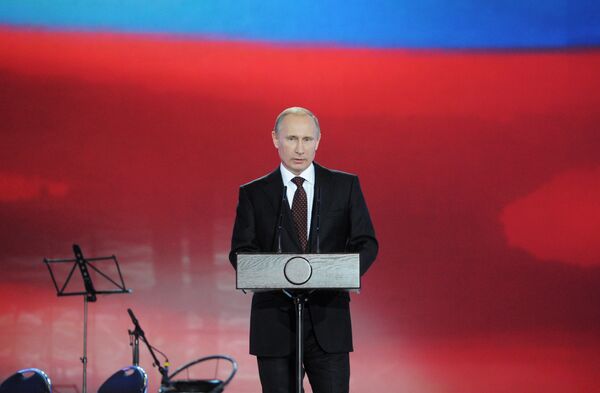As we come to the final stage of the election race, campaign rhetoric has become more open and direct, including for the race’s favorite, the United Russia party, and its leader, Vladimir Putin. He said at a meeting with United Russia leaders on Thursday that only the ruling party can help steer the country through the crisis.
“What our European friends and U.S. partners are facing [in the economy] also results from a lack of social cohesion, when the leading political forces are unable to find common ground,” Putin said in Novo-Ogaryovo. “I hope this will not happen in Russia. In this regard, I would like you to focus on the need to get the best results during the upcoming elections. If we fragment parliament and find ourselves unable to take the right decisions at the right time, making promises instead and living at the expense of future generations, this could take us as close to the brink as our partners and friends in Europe are now.”
But will this strategy succeed?
“Exploiting people’s fears of a new crisis has long been a part of United Russia’s election strategy,” said Mikhail Vinogradov, head of the St. Petersburg Policy Foundation. “Along with President Medvedev’s statement on the ballistic missile shield, this is part of United Russia’s fight for traditionalist voters, that is, people who are afraid of the future and who trust neither the West, nor reforms nor change in general. The goal of such statements is to win over part of the traditional Communist and LDPR electorates.”
Lev Gudkov, head of the Yury Levada analytical center, said that taking advantage of the public's fears could succeed, because “Russians’ political culture is focused on anxiety.” According to the center, what Russians fear most are growing prices and unemployment, which translates directly into fear of a crisis. In his speech on Thursday, Putin highlighted United Russia’s ability to overcome the crisis.
He cited the 2008-2009 crisis as an example, saying that the concerted efforts of Russia’s executive and legislative authorities, the stabilization fund and the decision not to make promises that could not be financed from the budget helped the government harness the two above-mentioned fears of inflation and unemployment.
Gudkov also said that these anxieties are especially strong among women aged 40-50. According to the Levada Center, up to 70% of Russian families have no savings, while two-thirds of the remaining 30% have reserves that could only keep them afloat for three or four months if they lose their jobs or if inflation soars.
Will United Russia manage to mobilize the traditionalist electorate? Shortly before Putin met with party leaders, the St. Petersburg Policy Foundation published its expert forecast which promised that United Russia would receive 57% of the vote, and spotlighted the strong points of its election campaign. For example, the party has stolen the Communists’ idea of reviving the Soviet Union and has manifested this idea as a Eurasian Union put forth by Vladimir Putin. On the other hand, the party began its campaign a bit late, the ratings of its leaders have been falling for most of 2011, and so redirecting the flow of this trend on the eve of elections could prove to be impossible.
St. Petersburg Policy Foundation’s Mikhail Vinogradov praised United Russia’s tactic of luring over Communist and LDPR voters, adding that this situation could also benefit A Just Russia, which has an opportunity to become a fourth parliamentary party in the next State Duma.
A Just Russia party is eroding the Communist opposition and hence can hope for at least a neutral attitude from the authorities. Vinogradov added that United Russia leaders’ strong personal dislike for their counterparts from A Just Russia can be described as an “inter-species” struggle between two parties created with the Kremlin’s stamp of approval.
However, the main enemy of United Russia is not the KPRF, or A Just Russia or the LDPR, but public disappointment fuelled by the party’s overuse of pressure. The irritation of regional officials with the slogan of an opposition party, “For a Russia without crooks and thieves,” was interpreted by bloggers and the general public who monitor political events as proof that “the hat fits.”
Many experts believe that a different medium should have been chosen for broadcasting President Medvedev’s meetings with bloggers and other young users of social networks. These meetings were shown on TV, which bloggers don’t watch, but the traditionalist electorate does, and it dislikes people talking about that alien device, the internet.
As a result, Medvedev’s electorate has been demoralized and can hardly be counted on to help United Russia. Those who viewed Medvedev as an alternative to Putin were disappointed by the September announcement of the reshuffle in the ruling tandem, and may refuse to take part in the elections. As for Putin’s former electorate, the party will have to work very hard to convince it to come out to the polling stations and not to vote for the Communists or any other opposition party.
The views expressed in this article are the author's and may not necessarily represent those of RIA Novosti.

